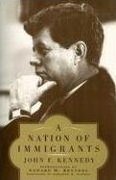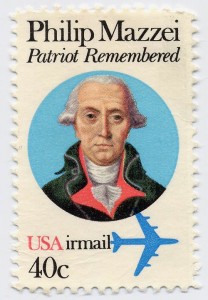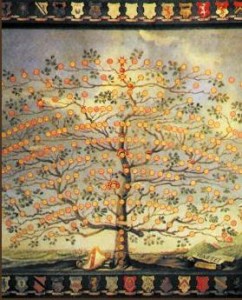 Filippo Mazzei was an Italian physician, promoter of liberty, and – many argue – an American Patriot. He was a close friend of Thomas Jefferson and acted as an agent to purchase arms for Virginia during the American Revolutionary War.
Filippo Mazzei was an Italian physician, promoter of liberty, and – many argue – an American Patriot. He was a close friend of Thomas Jefferson and acted as an agent to purchase arms for Virginia during the American Revolutionary War.
.
Mazzei and The Declaration of Independence
The quotation “All men are created equal” has been called an immortal declaration and perhaps the single phrase of the United States Revolutionary period with the greatest continuing importance. Thomas Jefferson first used the phrase in the Declaration of Independence as a rebuttal to the going political theory of the day: the Divine Right of Kings. It was thereafter quoted or incorporated into speeches by a wide array of substantial figures in American political and social life.
Historians believe Thomas Jefferson borrowed the expression from his Italian friend and neighbor. In 1774, Filippo Mazzei wrote this for The Virginia Gazette:
“Tutti gli uomini sono per natura egualmente liberi e indipendenti. Quest’ eguaglianza è necessaria per costituire un governo libero. Bisogna che ognuno sia uguale all’altro nel diritto naturale.”
Translated by a friend and neighbor of Mazzei, it was published as follows:
“All men are by nature equally free and independent. Such equality is necessary in order to create a free government. All men must be equal to each other in natural law.”
In his book, A Nation of Immigrants, John F. Kennedy wrote:
 “The great doctrine ‘All men are created equal’ incorporated into the Declaration of Independence by Thomas Jefferson, was paraphrased from the writing of Philip Mazzei, an Italian-born patriot and pamphleteer, who was a close friend of Jefferson. A few alleged scholars try to discredit Mazzei as the creator of this statement and idea, saying that “there is no mention of it anywhere until after the Declaration was published”. This phrase appears in Italian in Mazzei’s own hand, written in Italian, several years prior to the writing of the Declaration of Independence. Mazzei and Jefferson often exchanged ideas about true liberty and freedom. No one man can take complete credit for the ideals of American democracy.”
“The great doctrine ‘All men are created equal’ incorporated into the Declaration of Independence by Thomas Jefferson, was paraphrased from the writing of Philip Mazzei, an Italian-born patriot and pamphleteer, who was a close friend of Jefferson. A few alleged scholars try to discredit Mazzei as the creator of this statement and idea, saying that “there is no mention of it anywhere until after the Declaration was published”. This phrase appears in Italian in Mazzei’s own hand, written in Italian, several years prior to the writing of the Declaration of Independence. Mazzei and Jefferson often exchanged ideas about true liberty and freedom. No one man can take complete credit for the ideals of American democracy.”
In 1980, the United States Postal Service, in conjunction with its Italian counterpart, issued stamps commemorating the 280th anniversary of Mazzei’s birth.
counterpart, issued stamps commemorating the 280th anniversary of Mazzei’s birth.
On September 12, 1984, Congressman Mario Biaggi entered an appreciation of Mazzei into the Congressional Record. The essay was written by Sister Margherita Marchione, a history professor at Fairleigh Dickinson University.
.
Filippo Mazzei’s Life
Filippo Mazzei was born in Poggio a Caiano in Tuscany. He studied medicine in Florence and practiced it in Italy and the Middle East for several years before moving to London in 1755 to take up a career as a merchant. While in London he met the Americans Benjamin Franklin and Thomas Adams of Virginia, who persuaded him to undertake his next venture.
In 1773 Filippo Mazzei led a group of Italians who came to Virginia to introduce the cultivation of vineyards, olives, and other Mediterranean fruits. He became a neighbor and friend of Thomas Jefferson, and the two of them began what became the first commercial vineyard in the Commonwealth of Virginia.
Jefferson asked Mazzei to plant a vineyard at his estate in Monticello, Virginia. In a letter to Mazzei dated July 1, 1779, President George Washington wrote, “I thank you for your obliging act of the culture of the wine, and I am happy to hear that your plantation of them is in so prosperous a way.”
Jefferson and Mazzei shared an interest in politics and libertarian values, and maintained an active correspondence for the rest of Mazzei’s life. Mazzei began to establish his reputation as a patriot by joining the revolutionary war effort. He became a private in the “Independent Company” of Albemarle when the British first landed troops at Hampton. Jefferson gave him a copy of the “Rough Draught” of the Declaration of Independence, while an excerpt of Mazzei’s “Instructions of the Freeholders of Albemarle County to their Delegates in Convention” was used by Jefferson in his attempt to institute a new state constitution. Mazzei also signed a petition for Jefferson’s Committee on Religion to abolish spiritual tyranny. By 1778 it was decided by Jefferson, Patrick Henry, George Mason and others that Mazzei’s efforts would be most useful abroad; he was sent to try to borrow money from the Grand Duke of Tuscany for Virginia and to gather useful political and military information for Governor Jefferson.
After briefly visiting the United States again in 1785, Mazzei travelled throughout Europe promoting Republican ideals. He wrote a political history of the American Revolution, “Recherches historiques et politiques sur les Etats-Unis de l’Amerique septentrionale”, and published it in Paris in 1788. As the first history of the American Revolution to be published in French, the book became known as a source about the truth of the American Revolution, a counterweight to British propaganda and French misinformation.
The success of his book led to his appointment as the Polish Chargé de Affaires in Paris. Mazzei furthered his career by moving to Warsaw to work as an agent for the enlightened King Stanislaus Augustus of Poland. The King had admired Mazzei’s efforts during the American and French revolutions, and Mazzei eventually helped to reestablish relations between France and Poland. He remained in Warsaw as the King’s privy councilor until the second division of Poland forced his retirement. He later spent more time in France and became active in the politics of the French Revolution under the Directorate. When Napoleon overthrew that government Mazzei returned to Pisa, Italy. He died there in 1816.
After his death the remainder of his family returned to the United States at the urging of Thomas Jefferson. They settled in Massachusetts and Virginia. Mazzei’s daughter married the nephew of John Adams.
.
The Mazzei Family

The history of the Mazzei family is closely linked not just to the history of winemaking in Tuscany, but to the political and cultural history of the entire region. The first documents that name the Mazzeis – originally from the winemaking area of Carmignano – date back to the early eleventh century.
The family coat of arms, bearing three wooden hammers, tools emblematic of the cooper’s trade, also dates back to this time. In the fourteenth century, the coat of arms instead displayed three iron maces that still adorn it today. Since the very beginning, the Mazzeis have been winemakers and active participants in Florentine cultural and commercial life, often times holding important posts in city government.
Ser Lapo Mazzei (1350-1412), a winemaker from Carmignano, dedicated to the art of making fine wine, was a Notary of the Florence city government and Proconsul of the Art of Judges and Notaries. His brother Lionardo also cultivated vineyards in Carmignano, in the Grignano estate, where he produced wine according to the instructions of his more expert brother, Ser Lapo.
There is an interesting series of correspondence between Ser Lapo Mazzei and Francesco Datini, the famous Merchant of Prato. The documents are rich in judicial and commercial advice and also contain many comments referring to agronomy and oenology. Winemaking, purchasing, and storage are recurrent themes in Ser Lapo’s letters: “Don’t concern yourself about the cost of the wine, though it be high: its goodness is restorative,” he wrote to Datini in 1394, inviting him to overcome his frugality and appreciate its quality.
Ser Lapo Mazzei is also considered the father of the Chianti name. He authored the first known document using the denomination, a commercial contract bearing his signature, dated December 16, 1398:
“To be paid, on December 16 (1398), 3 florins, 26 soldi and 8 dinars, to Piero di Tino Riccio, for 6 barrels of Chianti wine….the above pay by letter of Ser Lapo Mazzei.”
It is the granddaughter of Ser Lapo Mazzei, Madonna Smeralda, who was married to Piero di Agnolo da Fonterutoli, that the Mazzei family owes the ownership of the Fonterutoli estate, passed down from 1435 until today, across 24 generations.

Today, after almost six centuries, the Mazzei family — under the guidance of Lapo, who oversees the property with the help of his sons, Filippo and Francesco, — still devotes itself to winemaking, with a constant commitment, an eye towards innovation, and an abiding respect for the land.
I’ve had the opportunity to get to know Filippo and Francesco and their family, both at Bellavitae and in Tuscany. Their commitment to quality winemaking and the preservation of their family heritage makes it an honor to call them friends. The wine from the family’s estates reflects this commitment vintage after vintage. I urge you to try the wines from these historic vineyards. And this Independence Day, why not open a bottle and toast to a great American Patriot: Filippo Mazzei.
.
Further Reading:
- Circolo Culturale Filipo Mazzei
- Princeton University: The Letters of Thomas Jefferson
- Monticello: Philip Mazzei
- Mazzei official website
- Drink What You Like: 30 Days of Thomas Jefferson
- Filippo Mazzei: Researches on The United States
- Filippo Mazzei: Philip Mazzei, Jefferson’s “Zealous Whig”
- Filippo Mazzei: My Life and Wanderings
- Filippo Mazzei: Memorie Della Vita E Delle Peregrinazioni Del Fiorentino Filippo Mazzei.: V. 2 (Italian Edition)
- Margherita Marchione: Philip Mazzei: World Citizen
- Margherita Marchione: The Adventurous Life of Philip Mazzei
- Giancarlo Masini and Iacopo Gori: How Florence Invented America: Vespucci, Verrazzano, & Mazzei and Their Contribution to the Conception of the New World
.
